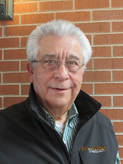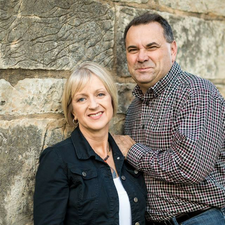 Most every pastor at some point in their ministry deals with people who are having problems in their marriage. Most every pastor is asked to officiate a marriage and along with that duty comes a time of sitting down with the couple and talking about the expectations of marriage. Normally it's called counseling and it's just part of the job of being a pastor. It's a hard job because the inclination is to tell the couple how to fix the problem, or give them 'how to's' that will help them live a happily-ever-after married life. Sometimes all your talk is good for nothing and you're left feeling you have failed at saving that marriage or preparing that couple for the marriage journey. Marriage coaching is a different approach that can help you help the couple to focus on the present and move forward, to figure out what will work best for them as a couple. Rev. Joel Oliver, ACC (ICF), CCLC, has developed and uses The One Thing Marriage Coaching Model as a tool in his role as a pastor and a coach to help people to have great marriages. He has graciously agreed to share this tool with you and we pray it will benefit you and the people you serve. Coaching Changes EverythingSince 2010, I was happily pastoring our church and blessed to be doing so. I had just come off a two-year term of being the Presbyter for the Assembly of God churches in our city. Our District leadership offered me the opportunity to attend a two-day coach training session put on by Coach Approach Ministries for their 501 course. I prayed about it and decided to attend. By the end of the first day's training, I remember telling myself, “Whatever this guy is talking about and doing, that’s what I want to talk about to others and do for others”. I was hooked and started my coaching journey full throttle. I remember asking myself, “How can what I am learning impact what I am currently doing, so I can do it better?” I became determined to figure out how to start “drawing out” rather than “pouring into” people. God quickly spoke to me about my passion and purpose for helping marriages become great marriages. I was convinced that moving to a 'coach approach' to help marriages become great marriages would be more effective and fruitful. Let me tell you how it works, and how it will benefit the people you serve. The Intake Session is to make sure the couple is suitable for marriage coaching and that you are the right coach for them. It establishes the Macro Coaching Purpose and the logistics of the marriage coaching. Beyond asking questions to establish the above, a typical Intake Session will include these questions or a variation of them:
C.H.A.I.N MODEL ™ FOR MARRIAGE COACHING
In the Connect Step, the wife and then her spouse is given up to 5 minutes each to share the one thing for that session that they want each other to know (this establishes their focus for the session). The listening spouse is asked not to speak, but to listen only. Both are asked to write down questions that they will ask. Some instruction on how to listen is given by the Coach to the couple. In the Hear Step, first the husband and then the wife are given 10 minutes to ask any questions that they might want to ask of their spouse. The Coach will give some instruction on how to ask good powerful open-ended questions. The Coach may also ask questions that facilitate the discussion and keep it moving forward. The Coach may also make appropriate direct statements when needed and with their permission. The Coach also must be ready to get the couple back on track if they stop moving forward and start going back to the past. In the Articulate Step, the goal is for both the husband and the wife to name their greatest need to improve as a husband or wife, in ways that will honor both of their values. The Coach must be ready to use appropriate strategies that will facilitate this process. In the Implement Step, the Coach can really make an impact. The Coach helps facilitate a dialog between the husband and wife that centers on developing personal S.M.A.R.T. action steps and S.M.A.R.T. action steps that they can work on together for a WIN-WIN. In the Notice Step, the Coach has the couple restate and reframe what progress has been made, and to make commitments with time lines for their action steps . The Coach helps the couple to celebrate wins. The goal of marriage coaching goes beyond the coaching relationship of the Coach and the couple. The goal is that the couple will relearn how to communicate. The real success marker of marriage coaching is when the couple learns the coaching techniques that will allow them to have a 'One Thing' conversation with each other as often as needed, now and in the future. Observations:
Masterful coaching changes everything including marriages. “What God has joined together, let no man put asunder.” (Matthew 19:6) Note: I developed this model and want to give special thanks to influences from Coach Approach Ministry (Bill Copper and Chad Hall-501 and 503 ™) , CoachNet Global C.H.A.I.N. Model ™ (Used by permission of Jonathan Reitz), Jeff and Jill William’s book “Marriage Coaching” and Stephen R. Covey’s book “The Seven Habits of Highly Successful People”.  Joel A. Oliver ACC, CCLC is the President of Insight Coaching STL, Training Coordinator of the SMD Coaching Network Coach, and a CoachNet Global ™ Coach Trainer. Feel free to email him with comments, or go to Insight Coaching STL to learn more. This article appeared in the Summer/Fall 2016 edition of the online Christian Coaching Magazine and is reprinted here with permission of the author.
0 Comments
 If I don't know anything about a subject or event, I usually ignore it, even if the subject matter kind of piques my interest. I can't tell you how many times I've missed out on a good thing because I didn't take the next step in getting answers to my questions. We have found that coaching is just one of those subjects that people don't know much about. Even though we have been talking about it within our District for quite a while now, it hasn't drawn much interest, especially from individuals who might benefit greatly from a coach. Why is that? Maybe we haven't given out enough information or information is hard to find. Maybe you haven't the time and energy it would take to find out more about coaching. Whatever the reasons, asking questions and getting answers are well worth both our time and effort. Here are our most asked questions about coaching: What is coaching? Coaching is the "art and practice of enabling individuals and groups to move from where they are to where God wants them to be...a coach leaves each person being coached with increased self-confidence, clearer direction, and greater fulfillment than he or she would have had otherwise. Coaching helps people expand their vision, build their confidence, unlock their potential, increase their skills, and take practical steps towards their goals. "Unlike counseling or therapy, coaching is less threatening, less concerned about problem solving, and more inclined to help people reach their potentials." (Dr. Gary Collins, Christian Coaching: Helping Others Turn Potential into Reality) As Christian life coaches, we include the Holy Spirit in the coaching process to give insight and discernment. In partnering with the Holy Spirit, we join with His transformational work in our client's lives. How much does it cost? Fees for coaching are negotiable between the coach and the client. SMD Coaching Network recommends $25 per hour if the coach has less than 100 coach training hours; $50 per hour if the coach has 100 or more coach training hours. Coaching fees can be paid by a bartering exchange, can be given pro bono, and can be as low as the price of a cup of coffee. How much time does it take? A coach can create a package of sessions, set up an ongoing schedule of sessions, or contract on an as-needed basis. Usually a session is one hour. The coach and client make an agreement on number of sessions, how and when to meet, cost, and expectations before starting the actual coaching. What happens in coaching? The coach builds a relationship with the client, listening and asking powerful questions that require more than a yes or no answer; provides confidentiality, and a plan of accountability and support to the client. The client sets the agenda, decides the purpose, the direction, and the outcome. From the questions, the client gains new perspectives and possibilities that lead to action steps. The client ends the coaching relationship feeling hopeful, accomplished and resolved. Still have questions? Talk to us at SMD Coaching Network. We will listen and help you find a coach. There's so much more to coaching than just time and money. Whatever the life issue, coaching clients hold a deep desire for more fulfilling, God-honoring growth in their lives. Coaching is an intentional investment that will help you to think differently and live and minister with greater purpose. AuthorLisa Harris is Network Coordinator for the SMD Coaching Network and has been coaching for 3 years.  "CALVIN! YOU BIG DUMMY!” I can still hear those words from my Junior High baseball coach being shouted across the field after I dropped an easily thrown ball from our shortstop to me, the first baseman. It wasn’t a positive day for me. So, you can imagine the thoughts running through my mind when it was presented for me to become a “coach”. Although I knew I would never yell at anyone, I still imagined sitting down with someone, getting a gist of their need, and then proceeding to tell them from my “wealth of knowledge” and “infinite wisdom” how they could solve their problem or head in the right direction. This perception couldn’t have been further from reality than a polar bear in the jungle. “…I discovered very quickly that the kind of coaching we were discussing was not about TALKING but LISTENING.”  As I began the training process, I discovered very quickly that the kind of coaching we were discussing was not about TALKING but LISTENING. We were continually reminded to be “an active listener”. This type of listening required hearing them not only with my ears, but also with my mind, which was displayed through my body language, eye contact, and limited verbal interaction. The goal was to ask intentional, thought-provoking questions to allow the client to “self-discover” what they needed to do about the issue at hand. Since every coaching session is ALWAYS about the client, they set the agenda for the session and not the coach. It was difficult in the beginning not to get in “counseling” mode by telling the person being coached what I thought they should do in a particular situation. I, also found out that the awkward silence after me asking a tough question to help them self-discover, was not a bad thing and that I had to let the person process and think before they were comfortable responding. The coaching training that I received through the SMD Coaching Network has made me rethink how I respond to people in everyday situations. The preacher in me continually wants to “tell” them what they should do and this needs to happen in some situations. The coach in me, however, now wants them to find this out on their own. The process of being a coach has strengthened my listening skills which is what many are really wanting and needing. People from all walks of life and backgrounds just want someone to listen to them! So even if I never become a coach with lots of clients, the listening element of coaching has, and will continue to benefit my ministry to people by really “hearing” what they are trying to say. If you are considering becoming a coach, I would strongly encourage you to invest in yourself and give it a try. Whether you are in full-time ministry or not, becoming a coach will sharpen your relational engagement with people- which is what it’s all about!
 If you were to ask me why I love coaching, I would tell you that my heart absolutely overflows with joy when I am able to develop a relationship with another woman that helps her move from Point A to Point B. It's true. Most importantly, I don't have to have the answers! By listening and asking thought-provoking questions, a coach is able to help her client define her goals, problem-solve, and see her dreams become reality. It was December 2011 in a conversation with another superintendent's wife, that I learned about coaching. It lit a fire inside me and I jumped on the first available opportunity for training. It was during that time that I also learned the value of having my own coach. Being a procrastinator, by nature, my coach held me accountable to meet deadlines I had set, taking me another step closer to reaching my destination. She asked questions that helped me think outside the box and affirmed me as, together, we celebrated my progress. What girl doesn't want to be heard? To feel that her life has meaning? Has purpose? I love being the person who listens, prays for discernment, asks the right questions, and watches as her client succeeds at being who God created her to be. I love coaching!
By: Greg Colegrove AG Level 2 Certified  About a year and half ago, I began a journey that has been so beneficial, both to my life and many others. Allow me to briefly share my journey: I have had the privilege of pastoring for over 25 years and being a part of Rural Compassion for almost 5 years. If there has been one thing I have dreaded the most in my 30 years of ministry it has been my weak attempts at counseling. Oh, don’t get me wrong-it didn’t start out that way. When I was young in ministry, I thought I could fix everybody! Yes, I was naïve and full of the Messiah complex! Then reality set in and over the next 29 years or so, all I wanted to do was “refer” people to go get the help they needed. If my preaching couldn’t fix their problem, there was nothing else I had to offer! Then, along came coaching. When the Southern Missouri District offered this opportunity to take some classes, I jumped at it. The classes taught me how to be a better listener and how to help people discover things for themselves. I didn’t have to have all the answers! Coaching has given me the opportunity to invest in rural pastors and to see people’s lives enriched, encouraged and challenged. It has created intentional friendships and accountability. I have seen my clients have that “aha” moment as they have discovered areas of their ministry where they have been stuck in their thinking and actions. We have had powerful conversations about where they are and where God is leading them as they discover passion for God and his work. Marriages, parenting, finances, church growth, personal growth and decision-making are all a part of our sessions. Today, my advice is two-fold for all pastors: First, coaching is a great tool. With coaching you are not having to come up with all the answers for people – they get to discover that on their own. Secondly, you need to have a coach of your own. It is amazing what happens when you start to unpack and confide in someone what you are thinking. You get action plans for your future! Progress is taking place. Hope is being renewed. Go ahead. Give it a try today. It may change your life and your direction!
By: Aaron Buer I’m currently obsessed with the stories of the Old Testament Kings of Israel. Their stories are fascinating.
There’s also a lot to learn from these guys – the good and the bad. Speaking of good and bad, King Solomon was a jumbled up mix of good and bad. On the one hand, he is described as the wisest man in history. On the other, he basically enslaved his people and apparently married every woman he met. 700?!? Come on bro. Let’s focus on his strengths. He was next-level wise. Leaders from all over the ancient world traveled great distances just to meet him and hear his wisdom. He was brilliant! I find it ironic that the wisest man of all time wrote more than anyone else about seeking counsel. Seriously, read through the Book of Proverbs. Every other verse is about seeking wise counsel: The way of fools seems right to them, but the wise listen to advice. Proverbs 12:15 For lack of guidance a nation falls, but victory is won through many advisers. Proverbs 11:14 Listen to advice and accept discipline, and at the end you will be counted among the wise. Proverbs 19:20 Wouldn’t it make sense that the wisest man in the world wouldn’t need counsel? I mean, come on, he’s the wisest man EVER! Who would possibly know more than him? My assumption is that the wiser I become, the less I will need the advice of others. In my mind, the 70 year old me will just be sitting around knowing the answer to basically every question ever... By Randy Helms  A Scriptural Argument for Coaching as a Transformational Process Is coaching in the Bible? Was Jesus a coach? We need to consider these questions because coaching has become an important part of the corporate and church landscape. None of the biblical leaders envisioned themselves filling the role of a coach. Not only does the Bible never use the title coach, there is not title, role, or ministry gift that parallels the task of a coach. We can, however, find coaching in biblical principles and practices. Coming alongside people to help them discover a better way, sustain vision, and move forward in their life or career is a direct reflection of the heart of God displayed in Scripture. Proverbs 20:5 states, “The purposes of a person’s heart are deep waters, but one who has insight draws them out.” This is the essence of coaching. Coaching is transformational at its core. Thomas Crane points this out by stating: “Transformational Coaching is the art of empowering people to improve their effectiveness … this process engages the huge untapped potential within people. "Tony Stoltzfus asserts: “At its heart, leadership coaching is about helping people … a coach draws out the abilities God has put in someone else.” We have an example of coaching in Mark 8:27–29. “Jesus and his disciples went on to the villages around Caesarea Philippi. On the way he asked them, ‘Who do people say I am?’ They replied, ‘Some say John the Baptist; others say Elijah; and still others, one of the prophets.’ ‘But what about you?’ he asked. ‘Who do you say I am?’ Peter answered, ‘You are the Messiah.’ ” Why do we consider this coaching on the part of Christ? According to the International Coaching Federation (ICF), coaching uses powerful questioning. The coach uses inquiry versus telling.3 Jesus could have told His disciples who He was. He chose instead to draw the answer from within His followers. Coaching includes exploring what issues exist for the person being coached versus telling him or her what the issues are or suggesting solutions. Questions must address the agenda of the person being coached and seek information about that agenda and orient to solving issues in the life of that person. Jesus’ first question does this because these men had left family and home to follow Him. Jesus caused them to scan the environment and come to grips with others’ perceptions, plus their perception of themselves. Then He probed deeper with a powerful question that forced the disciples (Peter in particular) to take ownership of the issue. Jesus then used this revelation He excavated from within them as a foundation on which to build.... This article was originally written for Enrichment Magazine, used with permission.
By Rhonda Amer  I’ll never forget as a young woman in my 20’s and 30’s, trying to make decisions, having a bout with depression, going to a counselor and him saying to me “Rhonda, you don’t need a counselor, you just need someone to talk things through with so you don’t always feel you are making big decisions alone.” Fast forward to my becoming a SMD Coach in 2015, and I realized coaching would have made all the difference in the world for me. Most people are capable of coming to their own resolve, but just need some effective “coaching, tools, and confidence” to help them! We ALL need a PLAN! The right coach will ask proper questions designed to help YOU define top issues, set priorities, and create an action plan that can literally be life-changing. There is nothing quite as gratifying as “coaching” someone through a situation, yet they are the one that actually came up with the solution. Coaching is all about “them” and their desired goals and results. Coaching is a wonderful ministry tool and aligns perfectly with our District mission of Resource – Relationship - Renewal. God has great purpose for everyone and equipped each with exactly what is needed for us to fulfill that purpose.  Rhonda Amer is the Business Administrator in the Southern Missouri District Council. She has been a part of the SMD Coaching Network since 2015. With the skills she has learned through the SMD Coaching Network, she has been able to minister to several individuals in the District, and is loving her coaching experience. We are happy to have her on our team! If you are interested in getting connecting with her, visit our Find a Coach page. Did you know that coaching has become the second fastest growing industry in the United States? It has become an integral part of our society. Through coaching, people across our country, have been given the opportunity to build relationships, gain self-confidence, and achieve success without doing it on their own.
According to CoachNet Global, a collaboration, and multiplication coach training organization, since 2015, there have been 500 individuals that have started their coaching journey. These students view coaching as a way to maximize potential, optimize work performance, and define strengths and weaknesses. It is a movement that has not only affected the business world, but it has also affected individuals that are in ministry. Approximately 50% of those 500 students were pastors in 52 different denominations. These individuals have pursued a coaching journey because of the impact it has made on their ability to minister to others. The leadership skills that they have gained have helped them balance their ministry and daily life at home, be an accountability to others, and better reach their communities for Christ. Imagine if all of our ministers in the District began a coaching journey. Imagine the impact they could make on their ministry, their home, and in their personal walk with the Lord. In the July Issue of Developing a Coaching Culture, we will be featuring one of our coaches, Rhonda Amer, and she will be sharing her testimony on how coaching has transformed her ability to minister to others. We hope to see that just as men and women have shined in the coaching world across our country, we will start to witness more coaches be a part of the SMD Coaching Network. SMD Coaching Network is dedicated to creating a coaching culture in our District. With the partnership of CoachNet Global, SMD Coaching Network can provide the proper coach training for ministers in our District. Please continue praying for this ministry, pray that many individuals from our district will begin joining the Network so that they may be equipped with the proper coaching skills to be a blessing to their communities. If you are interested in learning more about your coaching journey, visit our Contact Us page and we will help you get started on your coaching journey. By Jane Creswell Here are seven ways Christ-centered coaching can infuse new life into your ministry and in those you lead. Christ-centered coaching can be beneficial to ministry leaders in a variety of ways. Over 10 years of coaching, I have seen seven benefits that keep recurring. Christ-centered coaching: 1. leverages a person’s strengths. 2. provides clarity and focus. 3. instills confidence. 4. catapults learning. 5. fosters intentional progress. 6. rubs off on others. 7. encourages God-sized goals. Not every ministry leader experiences all of these benefits, but most experience them at some level. Thus they are able to transition from just barely surviving the challenges to thriving in their calling. What do these benefits look like, practically speaking? “Charles” is a ministry leader who has experienced these benefits. Here is an example of what the benefits can look like in daily ministry. Charles has pastored a relatively large church (500-plus attending Sunday worship) for 20 years. He has earned respect beyond his congregation. People across the district recognize his name and appreciate his leadership. If you ask pastors in the area to name a pastor who is successful, many would put Charles at the top of the list. His congregation loves him. He has a great family life, with kids who are proud of him. But while Charles has achieved a level of success, he feels a lack of challenge. Charles wonders: What’s next? I have a lot more years of ministry in front of me. Is God calling me to use my successful experience to have greater impact for the Kingdom... This article originally appeared in Enrichment Journal and has been adapted with permission.
|
Our Vision:
Every leader needs to be coached; every leader needs to become a trained coach. Categories
Archives
August 2018
|







 RSS Feed
RSS Feed
